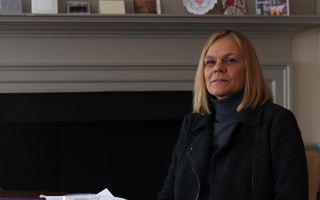{shortcode-4052a2157c5339fd2860294d24052aaa284c1f69}Interim Dean of the Graduate School of Arts and Sciences Emma Dench said there was nothing “unusual” about Harvard’s decision to not admit Michelle Jones, a formerly incarcerated scholar whose rejection from the History department’s Ph.D. program gained national attention earlier this year.
At Tuesday's meeting of the Faculty of Arts and Sciences, Anthropology professor Rowan K. Flad took the microphone during the open question period to ask why Jones, who served over twenty years in prison, was not admitted to Harvard. Jones’s application was the subject of a story published in the Marshall Project, which covers criminal justice issues, and the New York Times last month. The story prompted more than 150 professors to sign a letter condemning the decision to reject Jones.
Flad asked how often the Graduate School of Arts and Sciences overruled departmental decisions on Ph.D. candidates and if GSAS typically considers criminal history when making admissions decisions.
“As I understand it, a recommendation of admission by the department of History was not accepted in this case by the GSAS dean, but an explanation for why the recommendation was not accepted has not been given, as far as I know, although an explanation has been requested,” Flad said.
University President Drew G. Faust directed the question to Dench, who did not have administrative oversight of GSAS at the time of Jones application; Permanent GSAS Dean Xiao-Li Meng, who oversaw the admissions process, began a sabbatical this academic year. Dench said she did not know why Jones was not admitted, and a spokesperson for Meng declined to comment on Jones’s application.
Dench said she worried that the recent press coverage surrounding Jones’ application has created a breach of privacy for the University. Harvard does not discuss the status of any applicant past or present.
“I think one of the disturbing aspects of the fallout from the New York Times article has been the disclosure of very confidential details which put our whole process in peril,” Dench said.
Flad said that he has heard three speculative reasons why Jones wasn’t admitted: the administration was “concerned more about the optics of admitting an applicant with a criminal past,” GSAS didn’t believe Jones was prepared for the program, or that Jones did not adequately disclose her criminal history on her application.
“As if any of our Ph.D. applicants detail in full all aspects of their past,” he said.
Dench responded by saying that there was nothing “unusual” about the process by which Jones was not selected for admission.
"I think it’s possible to have the absolutely wrong impression that the lists are rubber-stamped, which I can assure you they are not,” she said, referring to departmental selections for Ph.D. candidates.
In regards to Flad’s second question, Dench said that past incarceration alone would not preclude a candidate from being accepted.
—Staff writer Joshua J. Florence can be reached at joshua.florence@thecrimson.com. Follow him on Twitter @JoshuaFlorence1.
–Staff writer Mia C. Karr can be reached at mia.karr@thecrimson.com. Follow her on Twitter @miackarr.
Read more in Faculty News
Faculty Hotly Debate Social Policy Motions, ReportRecommended Articles
-
 GSAS Dean to Take Sabbatical Next Year
GSAS Dean to Take Sabbatical Next Year -
Letter to the Editor: Misrepresented in Michelle Jones's Admission CaseJones’s case became front-page news only because the Marshall Project, which encourages leaks, received some, and then distorted facts in the service of its advocacy goal.
-
 In a Return to Historical Rates, GSAS Increases Ph.D. Stipends by 3 Percent
In a Return to Historical Rates, GSAS Increases Ph.D. Stipends by 3 Percent -
 GSAS Dean Commits to Focus on Graduate Student Advising
GSAS Dean Commits to Focus on Graduate Student Advising -
 Dudley House Splits Into Two Groups: One for Grads, One for Undergrads
Dudley House Splits Into Two Groups: One for Grads, One for Undergrads













